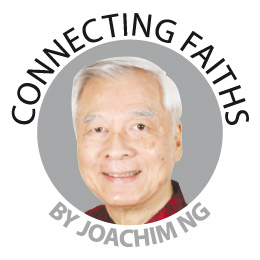LAST year it was fear of the cross that gripped non-Christians. This year it is fear of khat calligraphy that has gripped non-Muslims. We are marching into the 62nd Merdeka anniversary with fearful excitement. Ironically, there is no fear of climate change – only the fear of each other’s identity symbols.
Khat is part of Malay-Muslim artistry just as the cross is symbolic of Christian forgiveness. Does this mean that non-Muslims should not learn khat calligraphy, and non-Christians should not appreciate cross shapes? What is going to be next year’s fear factor? Indian yoga or Chinese yin-yang?
As Aug 31 approaches, remember the six children who were busy kicking each other’s sand castles while the tsunami was getting nearer. Although 98% of Malaysians are followers of six major world religions, the mistrust between them is a sign that we have neglected to fulfil an important function of religion.
The English word “religion” is derived from the Latin “re-ligare” coined during Roman Empire days. It means to tie (ligare) us back (re). From “ligare” we get ligament, and from “re” we get return. One purpose of religion is to tie us back, implying a severed connection. That severed connection is humanity’s Original Faith in nature. The severance occurred when hunter-gatherer tribes merged to become agricultural societies, leading to the growth of cities and civilisations that became alienated from nature.
Every civilisation has found it necessary to create one or more religious belief systems that act as socio-political glue unifying huge masses of people far beyond the capability of tribes. Some religious establishments to this day impose an exclusivity clause, requiring adherents to believe that only their religion holds the true way to salvation. While this exclusivism produces tight social bonding, it violates one of the fundamental operating principles of nature. Living systems are open systems; everything in nature is closely inter-linked and mystically entangled. There is no exclusivism in nature.
All scriptures advise returning to natural principles of living and they give strong hints of an Original Faith, before civilisation severed the bond with nature. Surviving hunter-gatherer tribes around the world, including the orang asli, have managed to keep this Original Faith largely intact.
Faith in nature is not a godless faith. If God is not in nature, where do you think God is? We are schooled to think of God as hovering above nature when the reality is that God abides within nature. To visualise God within nature, think of the air within an inflated balloon. Just as the air touches every point of the balloon’s surface, God touches every point in nature from within. You can find God through any religion, or directly through faith in nature.
Our separation from nature shows up each time we promote our own religion as superior, and we deny the truth in other religions to the extent of encouraging converts to renounce their parents’ religion.
But where in nature does any life form seek to obliterate diversity? Animals kill for dinner and herds often quarrel over territory, but the over-arching need for eco-diversity ensures that competition is limited and subsumed under a broader web of cooperation.
With religions unwilling to stop competing for supremacy against rivals, one genuine fear you must keep in mind as we celebrate Merdeka is that a knockout blow is on the way – from climate change. Six religions commanding adherence from 98% of Malaysians have failed to build interfaith cooperation at any level. It means that we are not united in facing the greatest threat to human survival.
When environmental conditions turn inhospitable for humans, what are our chances of rectifying the situation? Look at the threefold rise in dengue cases in just six months of this year over 2018 figures. We can’t even control the mosquito – an insect that breeds in our homes, drains, littered grass patches, and construction sites. Instead of calligraphy, a more needed school subject is public healthcare leadership. Teach students to form interfaith community networks that monitor health violations, demand better social discipline from adults, and tougher enforcement of rules by authorities.
The writer champions interfaith harmony. Comments: letters@thesundaily.com













